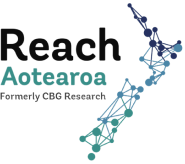Current Surveys

New Zealand Health SurveyHistorically, the NZHS was conducted every 4 years since its inception in 1992, with the final administration being completed in 2006/07. From April 2011, the NZHS and the various surveys that were part of the wider survey programme (e.g. Adult and Child Nutrition Surveys, Tobacco, Alcohol and Drug Use Survey, Te Rau Hinengaro [the New Zealand Mental Health Survey] and the Oral Health Survey) have been integrated into a single survey, which is now in continuous operation. In Year 8, CBG returned a weighted response rate of 80% for the adult sample and 79% for the child sample. In each of the preceding 7 years, CBG has returned a weighted response rate of 79% or more for both the adult and child samples. For more information and survey results please visit the Ministry of Health website. 
New Zealand Household Travel SurveyFor more information on the Travel Survey, please visit the Ministry of Transport website. 
New Zealand Crime & Victims SurveyFor more information, please visit the Ministry of Justice website. General Social SurveySelection as one of the 8,000 individuals is based on a fair statistical method, ensuring that every household in the country has an equal chance of being chosen. For more information, you can visit the Stats NZ website. |

Introducing the ISOoTH Study—an innovative research venture delving into the realm of sore throats, uncovering the prevalence of Strep A infections, scientifically known as pharyngitis.
This study signifies a momentous leap forward in developing a vaccine targeting Strep A bacteria, commonly referred to as 'Strep' or 'Strep Throat.' Its implications stretch beyond sore throats, with potential to address severe conditions like rheumatic heart disease.
The study is seeking participation of 500 children aged 3 to 14 years. Orchestrated by REACH Aotearoa on behalf of the University of Auckland, the study is set to commence in August 2023, extending through December 2024.
During this study's course, a dedicated research nurse from REACH Aotearoa will collect throat swabs, finger-prick blood samples, and saliva specimens from participants at three intervals—baseline, six months, and twelve months. Additional samples will be gathered if a participant reports a sore throat and subsequently tests positive for Strep A.
By engaging in this study, you can play a vital role in advancing knowledge and fostering healthier communities.
H. pylori in Aotearoa New Zealand Study
The H. pylori in Aotearoa New Zealand (HPANZ) study looks at how common Helicobacter pylori is in NZ. The University of Otago is inviting people to participate in this study.
H. pylori is a bacteria that many people have in their stomach. In a small number of people, it can cause stomach problems such as inflammation and ulcers. Over a long time this can increase the risk of stomach cancer, usually later in life. The good news is that H. pylori is easy to treat, and antibiotics can get rid of H. pylori for most people. This study will see who has H. pylori infection and whether having the infection overlaps with other risk factors for stomach cancer. This information is necessary to help with designing new approaches to prevent stomach cancer in Aotearoa New Zealand.
Getting a better understanding of how many people in Aotearoa New Zealand have H. pylori is an important step in planning future stomach cancer prevention measures in Aotearoa New Zealand and improving how we test and treat for H. pylori infection.
The study is being conducted by the University of Otago in conjunction with Reach Aotearoa Ipsos. Further information is available on the University of Otago website.
